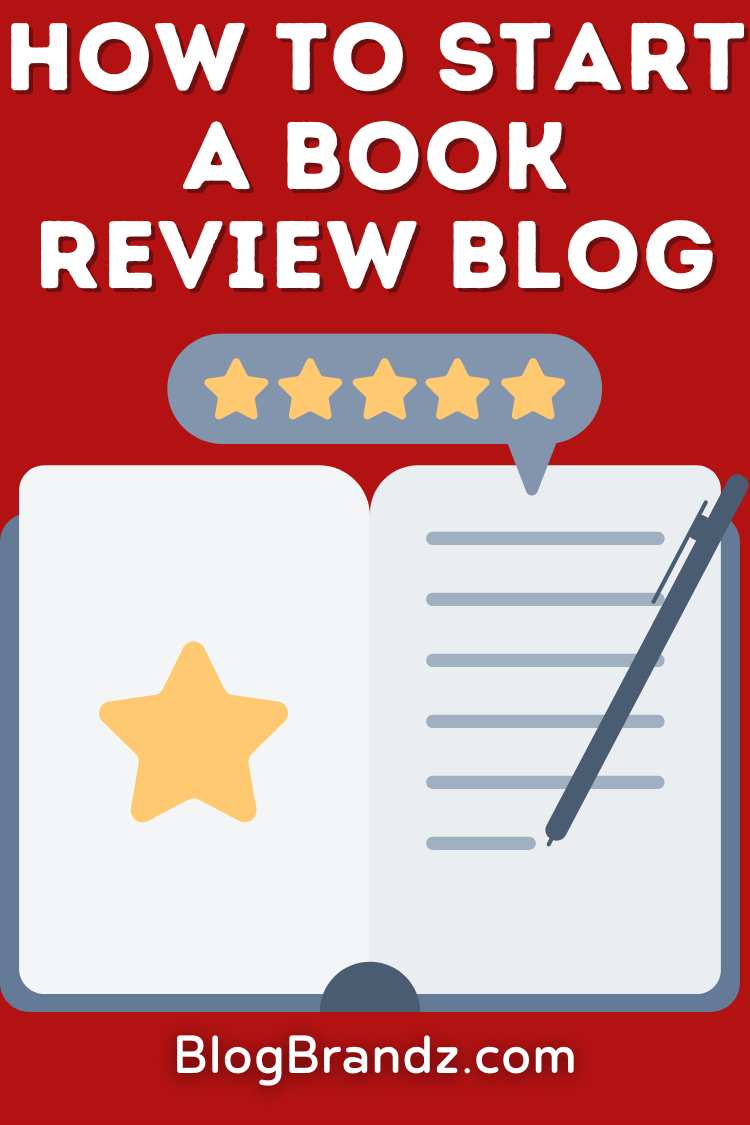
Learn how to start a book review blog from scratch, how to write a book review blog post, ways to monetize your blog, and build a community of book enthusiasts.
Are you passionate about books and looking for a creative outlet to share your love of reading with others? Starting a book review blog could be the perfect venture for you! In this article, we’ll guide you to start a book review blog from scratch.
Whether you’re an avid reader looking to share your thoughts on the latest bestsellers or a bookworm with a niche interest, we’ll help you lay the foundation for a successful and engaging blog that attracts fellow book enthusiasts.
Join us as we explore the steps to take, the tools to use, and the strategies to implement to launch your very own book review blog and connect with a community of literary aficionados.
Contents
How To Start a Book Review Blog
Book review blogs can be quite successful, but this can vary based on several factors such as the niche, quality of content, consistency, marketing efforts, and audience engagement.
As with any blogging business, it often comes down to creating quality content, building a loyal audience, and effectively promoting your blog. Here’s a step-by-step guide to starting a book review blog:
#1. Choose the right niche
Decide what types of books you want to review (e.g., fiction, non-fiction, specific genres) to attract a specific audience. Specializing in a specific genre or type of book can help attract a dedicated audience interested in that niche.
Ensure your book review niche is neither too broad nor too narrow and that you’re passionate about reading books in the niche you choose. Here are some examples of book review niches to build a community of raving fans:
- Military thriller book review blog: Focus on reviewing military-themed thrillers, exploring themes of espionage, warfare, and suspense.
- African book review blog: Highlighting literature from Africa, including fiction, non-fiction, and poetry, showcasing the diverse voices and narratives from the continent.
- Star Wars book review blog: Delve into the expansive (and ever-expanding) Star Wars universe, reviewing novels, comics, and reference books set in the galaxy far, far away.
- Action Thriller book review blog: Reviewing high-octane action thrillers, featuring adrenaline-pumping plots and gripping suspense.
- Personal Finance book review blog: Offering insights into personal finance literature, covering topics such as budgeting, investing, and financial planning.
- Political Book review blog: Analyzing books on politics, governance, and current affairs, providing critical reviews and thoughtful commentary.
- Children’s book review blog: Catering to young readers and parents, reviewing children’s books across genres and age groups, promoting literacy and a love for reading.
- Personal development book review blog: These blogs offer insightful critiques and summaries of books aimed at improving personal growth, offering readers valuable guidance and inspiration.
#2. Setup your book review blog for success
When setting up your book review blog, there are some steps you can take to ensure you get off on the right foot.
- Choose the right blogging platform:
Select a platform to host your blog. Popular options include WordPress, Blogger, and Medium. Self-hosted WordPress is ideal for monetizing your book review blog through Amazon affiliate marketing and sponsored book reviews.
Unlike free blog sites, a self-hosted WordPress blog offers the flexibility to diversify revenue streams and maximize your blog’s earning potential.
With full customization control, you can seamlessly integrate Amazon affiliate links into your content, earning a commission for each sale generated through your links.
Additionally, you can offer sponsored book reviews to authors or publishers, providing an opportunity to showcase their work to your audience in exchange for a fee.
Self-hosted WordPress offers scalability, enabling you to expand your monetization efforts as your blog grows and WordPress SEO plugins make it easy to optimize for search engine visibility.
To enhance your book reviews with essential details like title, author, cover image, star rating, and more, install the Book Review Block WordPress plugin. You simply input the book ISBN, and the block will automatically populate information such as the title, author, and cover image.
It also integrates Schema markup into the HTML, potentially boosting your site’s visibility in Google search results and driving more traffic to your book review site.
Learn how to optimize your book review blog with this step-by-step bloggers’ SEO checklist that will show you how to do SEO for beginners and increase your book review rankings.
Use the Amazon Affiliate WordPress plugin to easily track and optimize your Amazon affiliate links and sponsored content performance. This data-driven approach can help refine your monetization strategy and increase your revenue over time.
Self-hosted WordPress provides the flexibility, customization, and scalability you need to monetize your book review blog through Amazon affiliate marketing and sponsored book reviews.
- Select a domain name:
When choosing a domain name for your book review blog, it’s important to select a name that is memorable, relevant, and reflects the essence of your blog. Keep the domain name short, simple, and easy to spell to ensure it is easy for people to remember and type into their browsers.
Consider the availability of the domain name across social media platforms to maintain consistency in branding. Check for any trademarks or existing websites with similar names to avoid potential legal issues.
By choosing a domain name that is memorable, relevant, and reflective of your blog’s content, you can create a strong and recognizable brand identity for your book review blog.
- Set up your blog:
To ensure legal compliance and transparency on your book review blog, it’s important to include certain pages and disclosures. Here’s a guide to setting up your blog with these elements:
- About Page: Provide information about yourself, your blog’s purpose, and your background in book reviewing to establish E-E-A-T (Experience, Expertise, Authoritativeness, and Trustworthiness).
- Contact Page: Include a contact form or email address for readers, authors, and publishers to reach you.
- Review Policy: Clearly outline your review policy, including how you select books for review, your rating system, and any disclosure policies.
- Terms & Conditions (T&C): Draft T&Cs that govern the use of your blog. Include information on copyright, content ownership, user responsibilities, and disclaimers. Specify the jurisdiction for any legal disputes.
- Disclaimers: Include disclaimers to clarify your relationship with authors, publishers, and affiliate programs. Disclose any biases, conflicts of interest, or sponsorships that may influence your reviews.
- Affiliate Disclosures: If you participate in affiliate marketing programs, disclose this on your blog. Clearly state that you may earn a commission from qualifying purchases made through affiliate links.
- Privacy Policy: Create a privacy policy that explains how you collect, use, and protect personal information from your readers. Include information about cookies, data collection, and third-party services.
- Compliance Requirements: Ensure your blog complies with relevant laws and regulations, such as the General Data Protection Regulation (GDPR) if you have readers in the European Union. Familiarize yourself with disclosure requirements from the Federal Trade Commission (FTC) regarding affiliate links and sponsored content.
Regularly review and update your blog’s legal pages to reflect any changes in your blog’s policies or applicable laws. By setting up your blog with these elements, you can establish a transparent and legally compliant platform for sharing your book reviews with readers.
#3. Write useful, engaging book reviews
The success of your book review blog hinges significantly on the quality of your content. Start writing honest and detailed book reviews that provide value to your readers and include unique insights and opinions.
Providing insightful, well-written reviews that offer genuine value to your readers is crucial for several reasons:
- Credibility and trust: High-quality, original content establishes your blog as a credible source of information. Readers are more likely to trust your reviews and recommendations if they are well-written and insightful.
- Engagement and interaction: Quality content encourages engagement with your audience. Thought-provoking reviews spark discussions, comments, and shares, creating a sense of community around your blog.
- Search engine visibility: Search engines like Google prioritize useful, relevant content. Well-written reviews with valuable insights are more likely to rank higher in search results, increasing your blog’s visibility and attracting more readers.
- Audience growth: Engaging, high-quality content attracts and retains readers. As your audience grows, so does your blog’s influence and reach within the book-loving community.
- Longevity and sustainability: Blogs with high-quality content are more likely to stand the test of time. By consistently providing valuable content, you can build a loyal readership that keeps coming back for more.
By providing insightful, well-written book reviews that offer real value to your readers, you can build credibility, engage your audience, and ultimately grow your blog into a trusted resource for book lovers.
Resources:
- Become a Blogger: From Strategy To Writing
- Best AI Writing Courses for Writing AI Content
- SEO Content Writing Tutorial To Write SEO-Optimized Content
#4. Promote your blog and build your audience
By actively promoting your blog and engaging with your audience, you can build a loyal readership and establish your book review blog as a go-to resource for book lovers.
- Build a social media community: Share your book reviews on social media platforms like Facebook, Twitter, Instagram, and Pinterest. Use relevant hashtags and engage with followers to increase visibility.
- Join book communities: Participate in online book clubs, forums, and groups related to your niche. Share your reviews and engage in discussions to attract like-minded readers.
- Collaborate with other bloggers: Partner with book bloggers for guest posts, blog tours, or joint reviews. This can help you reach a wider audience and attract new readers.
- Engage with your audience: Respond to comments on your blog and social media channels. Encourage discussion and feedback to build a sense of community among your readers.
- Build an email list: Build a mailing list of interested readers and send regular newsletters with updates, recommendations, and exclusive content to keep them engaged.
- Offer incentives: Run contests, giveaways, or exclusive promotions to incentivize readers to subscribe to your blog or share your content.
- Cross-promote: Partner with authors, publishers, or book-related businesses for cross-promotion. This can help you reach new audiences and increase your blog’s visibility.
- Post consistently: Maintain a regular posting schedule to keep your audience engaged. Consider seasonal book releases, themed days, and weekly features to add variety to your content.
- Optimize your blog posts for search engines: Use WordPress plugins to add Review structured data, relevant keywords, meta descriptions, and tags. This can help your book reviews rank higher in search results, attracting more organic traffic.
- Create video book reviews: Publish video book reviews on platforms like TikTok, Instagram, and YouTube to reach a broader audience. Use visual storytelling techniques, using book covers, readings of your favorite passages, and creative editing to make your reviews stand out.
- Monitor analytics: Use tools like Google Analytics to track the performance of your blog and social media efforts. Adjust your promotion strategies based on what works best for your audience.
#5. Monetize your book review blog
It may seem like there are limited ways to monetize a book review blog. But if you think creatively, you’ll devise several ways to monetize your blog. Here are some suggestions:
- Affiliate marketing: Join the Amazon Associates affiliate program and promote books using affiliate links. You earn a commission for every sale made through your affiliate links.
- Sponsored content: Partner directly with authors, publishers, or companies to write sponsored book reviews or feature sponsored content related to books.
- Become a professional book reviewer: Apply to Reedsy’s book reviewer program. When readers enjoy your work, they can send $1, $3, or $5 (or an amount of their choice) your way.
- Become a book coach: Get book coach certification and gain the skills to guide authors to write, edit, and publish their manuscripts.
- Display advertising: Use ad networks to display ads on your blog and earn money based on the number of clicks or impressions the ads receive.
- Sell digital products: Create and sell digital products that book readers in your niche will love, such as e-books, reading guides, or printable book lists.
- Affiliate bookstores: Partner with online bookstores besides Amazon that offer affiliate programs and earn a commission for every book sale referred from your blog.
- Membership or subscription: Offer premium content, exclusive book reviews, or early access to reviews for a subscription fee.
- Merchandise: Create and sell merchandise related to your blog, such as bookmarks, book-themed apparel, or bookish accessories.
- Events and workshops: Host book-related events, workshops, or webinars and charge a participation fee.
- Offer exclusive content: Use platforms like Patreon to allow your audience to support your blog financially in exchange for exclusive content or perks.
- Start a paid newsletter: Use Jetpack’s Newsletter feature to start a paid newsletter on your WordPress blog and provide exclusive content and offers.
- Offer book promotion services: As a book review blogger, you can offer services such as building a book launch team, beta reading, editing, or book promotion packages to authors and publishers for a fee.
- Build a Facebook group for authors: Starting a Facebook group for your book review blog can help you attract authors to sell your book review services.
- List your book review gig on Fiverr: Describe your book review service in your Fiverr gig, including your experience, approach to reviewing books, and any specific genres you specialize in. Check the Fiverr book review gigs below for some examples.
By diversifying your monetization strategies, you can maximize your blog’s earning potential and create a sustainable blogging income from your book review blog.
How To Write a Book Review Blog Post
Writing a book review blog involves more than just summarizing the plot. It’s about sharing your thoughts, insights, and opinions about a book in a way that engages and informs your audience.
Here’s a step-by-step guide to help you write compelling book reviews:
#1. Read the book thoroughly
Start by reading the book thoroughly. Take notes on key themes, characters, and your reactions. This will help you provide a detailed and insightful analysis in your review, enhancing the value for your readers and demonstrating your understanding of the book.
#2. Understand the book’s context
Understanding the context of a book can greatly enhance the depth of your review. For example, researching the author’s background can provide insights into their motivations and influences.
Understanding the genre can help you identify common themes and conventions relevant to your analysis. Researching the historical or cultural context in which the book was written can help you appreciate the significance of its themes and messages.
By taking the time to understand the context of the book, you can provide a more nuanced and informed review that adds value for your readers.
#3. Structure your book review
Begin with a brief introduction that includes the book’s title, author, genre, and plot summary. Then, discuss the following aspects:
- Plot: Provide a summary of the plot without giving away spoilers.
- Characters: Describe the main characters and their development throughout the story.
- Themes: Discuss the main themes or messages conveyed in the book.
- Writing Style: Comment on the author’s writing style, use of language, and storytelling techniques.
- Personal Reflection: Share your thoughts, feelings, and opinions about the book. Discuss what you liked or disliked and why.
- Recommendation: Conclude your review with a recommendation for your readers. Would you recommend the book? Why or why not?
Click here to download a free book review blog template
#3. Use quotes from the book
Incorporating quotes from the book can add depth and credibility to your review. For instance, if you’re discussing the author’s writing style, including a quote that showcases their use of language or imagery can provide readers with a tangible example.
Similarly, if you’re analyzing a character or theme, a quote that highlights a key moment in the book can help illustrate your point.
By including quotes, you support your arguments and give readers a taste of the book’s content and style, helping them decide if it’s a book they’d like to explore further.
#4. Be honest and balanced
Being honest and balanced in your book review is crucial for maintaining credibility with your audience. For example, if you enjoyed the book, explain what aspects you liked and why.
Conversely, if you found the book lacking, be specific about its shortcomings while also acknowledging any positive aspects.
Striking a balance between highlighting strengths and weaknesses helps readers make informed decisions about whether the book aligns with their preferences.
#5. Engage your audience
Engaging your audience is key to building a community around your blog. Write in a conversational tone, as if you’re chatting with a friend over coffee.
Encourage readers to share their thoughts and opinions in the comments section. Respond to comments to foster discussion and show that you value your readers’ input.
#6. Proofread and edit
Proofreading and editing your review before publishing is essential to ensure it is polished and professional. Look for grammar, spelling, and punctuation errors, and make corrections as needed.
Edit for clarity and coherence, ensuring your review flows smoothly and is easy to understand. Taking the time to proofread and edit can significantly improve the quality of your review and enhance your credibility as a reviewer.
#7. Add a call to action
Add a call to action at the end of your review to encourage reader engagement. For example, you could ask readers to share the review on social media if they found it helpful.
You could also invite them to leave a comment sharing their thoughts on the book or to explore other reviews on your blog. A call to action helps drive interaction and can help grow your blog’s audience.
Writing a book review blog requires practice and patience. As you write more reviews, you’ll develop your unique writing style and voice, which will help you connect with your audience and become a trusted source for book recommendations.
How To Create a Compelling Video Book Review
To create a compelling video book review start by jotting down key points you want to cover, such as the plot, characters, themes, and your overall thoughts.
When filming, ensure good lighting and sound quality to enhance the viewing experience. Introduce the book and provide a summary without giving away spoilers.
Share your thoughts on what you liked or disliked about the book, supporting your opinions with examples from the text. Use visuals like book covers, relevant images, or footage to make your video more engaging.
Summarize your main points and give your final recommendation. Encourage viewers to share their thoughts in the comments and consider adding a call-to-action, such as subscribing for more reviews.
After filming, edit your video to enhance its quality and add any additional elements like captions or music. Upload your video to your chosen platform and share it with your audience.
Don’t forget to add relevant hashtags (like #BookTok for TikTok and #Bookstagram for Instagram), and engage with viewers to build a community around your book reviews.
Resources:
- Video Production Essentials: Create, Edit & Post Online
- Storytelling Through Video for Filmmaking Enthusiasts
- ChatGPT For Video Creation & Editing Complete Guide
- YouTube Marketing: YouTube SEO & Algorithms
- How to Start, Grow, and Monetize a YouTube Channel Fast
Book Review Best Practices
#1. What tags to use for book review blogs?
For a book review blog, you might consider using tags that describe the genre, themes, or elements of the books you review. Here are some examples:
- Genre tags: Fiction, Non-Fiction, Mystery, Thriller, Romance, Science Fiction, Fantasy, Historical Fiction, Biography, Memoir, etc.
- Theme tags: Love, Friendship, Adventure, Coming of Age, Identity, War, History, Politics, Science, etc.
- Author tags: Tagging the author’s name can help readers find other books by the same author.
- Series tags: If the book is part of a series, you could use tags for the series name or the order in the series (e.g., Harry Potter, Book 1).
- Format tags: Hardcover, Paperback, Ebook, Audiobook, etc.
- Age group tags: Adult, Young Adult, Middle Grade, Children’s, etc.
- Diversity tags: LGBTQ+, BIPOC (Black, Indigenous, People of Color), Disability, Mental Health, etc., to highlight diverse representation in books.
- Rating tags: 5 stars, 4 stars, etc., to indicate the rating you gave the book.
- Miscellaneous tags: Bestsellers, Award Winners, Classics, Must-Reads, Book Club Picks, etc., to categorize books based on their popularity or status.
You can choose tags based on what you think your audience would find helpful and what best represents the content of your reviews.
#2. When writing a book review blog should I link to the author of any book I review?
Yes, of course! Linking to the author’s website or social media profiles can add value to your book review blog, especially if the author is active online or if readers are interested in learning more about the author.
Here are a few reasons why you might consider linking to the author:
Author Engagement:
Linking to the author’s website or social media profiles can encourage the author’s engagement with your review. Authors may appreciate the mention and could potentially share your review with their followers, increasing your blog’s visibility.
Additional Information:
The author’s website or social media profiles can provide readers with additional information about the author, such as other books they’ve written, upcoming events, interviews, and more. This can enrich the reader’s experience and make your review more informative.
Credibility:
Linking to the author’s website or social media profiles can add credibility to your review. It shows that you’ve done your research and are providing readers with reliable information about the author.
SEO Benefits:
Linking to authoritative websites, such as the author’s website, can improve your blog’s search engine optimization (SEO) by providing relevant outbound links.
However, it’s not necessary to link to the author’s website in every review. You can decide whether to include a link based on the relevance and value it adds to your review. If you decide to include a link, make sure it is relevant and adds value to your readers.
Famous Book Review Blog Sites
This list of renowned book review blog sites has helped readers discover new titles, gain insights into popular books, and find trusted sources for literary recommendations.
These book review blog examples offer comprehensive summaries of books, helping readers decide which books to read next. Check them out for inspiration on starting a book review blog and learning how to write a compelling book review blog post.
#1. Goodreads
Goodreads is a go-to platform for book lovers, offering a vast collection of book summaries and reviews contributed by a diverse community of readers. While not a traditional blog, its wealth of detailed reviews and summaries make it an invaluable resource for readers seeking insights and recommendations for their next read.
#2. Book Riot
Book Riot is a vibrant hub for book enthusiasts, offering a diverse range of book reviews, recommendations, and summaries spanning various genres. Whether you’re into thrillers, romance, or non-fiction, it has something for every reader, making it a must-visit for book lovers everywhere.
#3. Kirkus Reviews
Kirkus Reviews is a trusted source for professional book reviews and summaries, offering readers valuable insights into newly released books. Whether you’re looking for your next favorite read or want to stay updated on the latest releases, it has you covered.
#4. The New York Times Book Review
The New York Times Book Review is a prestigious publication that features reviews, summaries, and in-depth features on notable books and authors. With its insightful commentary and expert analysis, it’s a go-to source for literary enthusiasts seeking to stay informed about the latest trends in literature.
#5. NPR Books
NPR Books is a treasure trove for book lovers, offering a rich collection of reviews, interviews, and summaries of books featured on their programs. With its thoughtful analysis and diverse selection of titles, it’s a valuable resource for readers looking to discover new and noteworthy books.
#6. The Guardian Books
The Guardian Books is a comprehensive source for book lovers, offering a wide range of reviews, summaries, and articles on books and authors worldwide. Whether interested in literary classics or contemporary fiction, it provides insightful coverage that keeps readers informed and engaged.
#7. Four Minute Books
Four Minute Books is a website with over 1,200 free book summaries of the world’s best books. It allows subscribers to read each one in just 4 minutes to learn 3 valuable lessons. They publish a new, free book summary and an animated book summary every week at the same time on their YouTube channel.
Starting a book review blog requires dedication, passion for reading, and a commitment to providing valuable content to your audience. With time and effort, you can build a successful book review blog that resonates with readers who share your love for books.
© 2024, Priya Florence Shah. All rights reserved.
Priya Florence Shah is a bestselling author and an award-winning blogger. Check out her book on emotional self-care for women. Priya writes short stories and poetry and chills with her two-legged and four-legged kids in her spare time.
Discover more from Business & Branding Tips
Subscribe to get the latest posts sent to your email.














